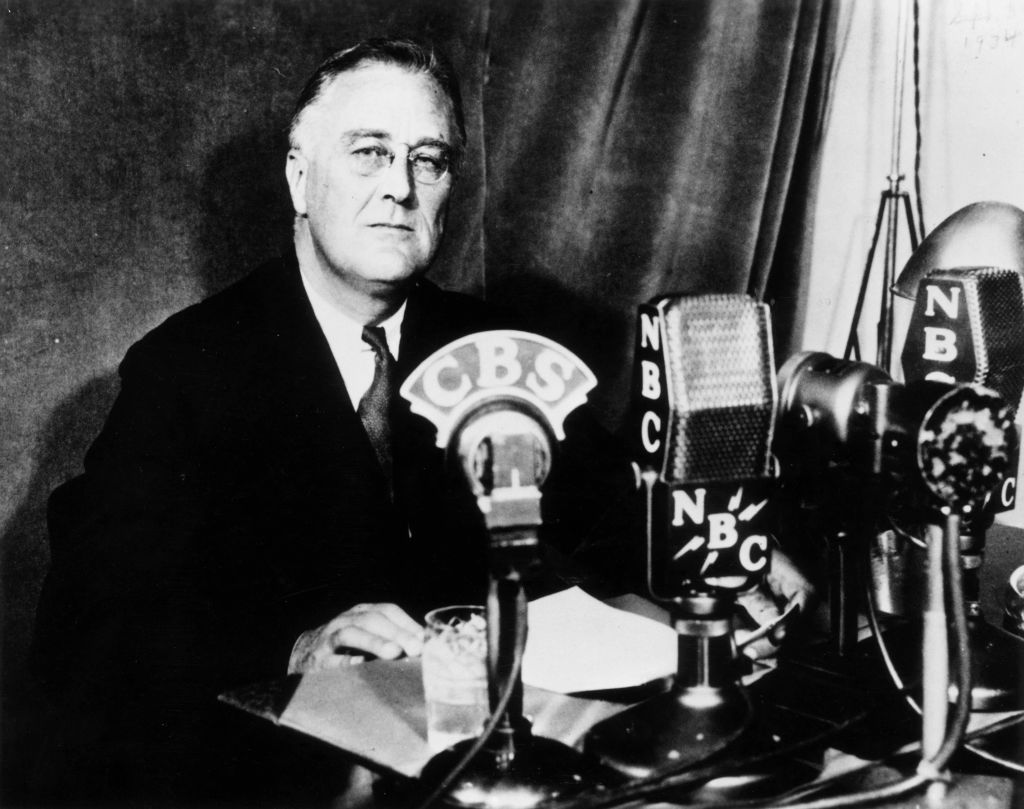
A Christmas Message from President Franklin D. Roosevelt and Prime Minister Winston Churchill, 1941
*Editor’s note: The following is President Franklin Delano Roosevelt’s message to Americans just weeks after the bombing of Pearl Harbor. He then introduced Prime Minister Winston Churchill, who had traveled to Washington D.C. to meet with his key American ally and plan for the coming war.*
President Roosevelt’s Address:
Fellow workers for freedom: Many sincere and faithful Americans are asking themselves this Christmas: How can we celebrate amidst a world at war, a world of fighting, suffering, and death? How can we pause, even for Christmas Day, from the urgent task of arming ourselves against our enemies? How can we put aside the world’s turmoil to rejoice in the birth of Christ, as in peaceful years past?
These are natural questions, echoing across the globe in every corner resisting evil. Yet, as we ask them, we know the answer. This nation needs more than just weapons and war materials; we need to prepare our hearts, to arm our spirits. When we ready our hearts for the labor, suffering, and ultimate victory ahead, we can observe Christmas Day—with all its memories and meanings—as we should.
Looking ahead, I have designated a day of prayer, as stated in my proclamation: “The year 1941 brought upon our Nation a war of aggression… The new year of 1942 calls for the courage and resolution of all to win this world struggle… We are confident in our devotion to country and freedom, but our strength is greater when God upholds us. Therefore, I appoint the first day of 1942 as a day of prayer…”
We need God’s guidance to be humble yet strong in our convictions, steadfast in enduring sacrifice, and brave in achieving victory for liberty and peace. Our strongest weapon is the conviction of human dignity and brotherhood—the very essence of Christmas. Against enemies who preach and practice hate, we counter with faith in human love and God’s care for all mankind.
It is in this spirit, and with special thought for our sons and brothers serving in the armed forces, that we light our Christmas candles this eve, from coast to coast. We stand with many nations and peoples engaged in defending good, often at the cost of their lives. One of their great leaders stands beside me. He and his people, like us, celebrate Christmas with their children. They have shown the way in courage and sacrifice for the sake of children everywhere.
Therefore, I ask my associate, my old and good friend, to address the American people tonight: Winston Churchill, Prime Minister of Great Britain.
Prime Minister Churchill’s Address:
Fellow workers in the cause of freedom: I have the honor to add to the Christmas goodwill already extended to the homes and families of the United States by the President’s message.
Though far from my country and family, I don’t feel far from home. Whether it’s the ties of blood, longstanding friendships, or the comradeship in our common cause, I feel a sense of unity and fellowship here. I feel welcome, and I have the right to sit at your fireside and share your Christmas joys.
This is a strange Christmas Eve. The world is locked in deadly struggle. Nations, armed with terrifying weapons, advance upon each other. It would be wrong if greed or ambition had led us to this conflict. Yet, amidst the raging war, we find peace of spirit in our homes and hearts.
Therefore, let us cast aside our cares, at least for tonight, and create happiness for our children in this world of storm. Let each home be a brightly lit island of happiness and peace. Let the children laugh and play. Let the adults share in their joy before returning to the formidable year ahead, resolved that these children will not be robbed of their inheritance—the right to live in a free and decent world.
And so, in God’s mercy, a happy Christmas to you all. May you all have a very happy holiday season and here’s to a bright New Year.
(Note: The concluding sections of the provided text regarding the Minnesota Reformer and its publishing information have been omitted as they are unrelated to the historical speeches themselves.)

